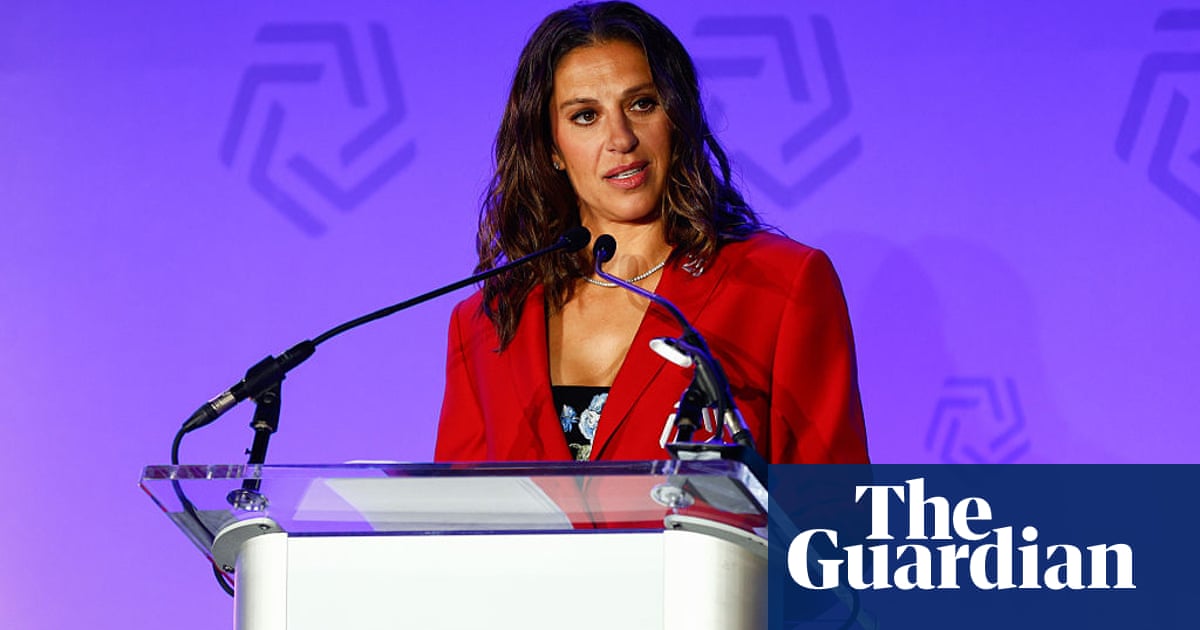It’s been almost four years since Carli Lloyd announced her retirement as a player, and it appears to have been a transformative time for the three-time World Cup champion.
In a speech at her induction to the US Soccer Hall of Fame on Sunday, Lloyd struck a different tone than the one she used so often throughout her playing career, apologizing to her teammates for not being fully present as she single-mindedly pursued her goals as a player. Saying she “wasn’t there to make friends” and that she “avoided unnecessary drama,” Lloydwas well known by the end of her careerfor her steely demeanor that ran counter to some of her era’s more outgoing personalities like Megan Rapinoe and Alex Morgan.
“I’m sorry I wasn’t always able to give you all of me,” Lloyd said on Sunday, addressing her former teammates. “I wouldn’t say I have regrets, but if there’s one thing I do wish, I wish I had let more people understand me over the years. I operated like an emotionless machine. I was intense and I truly believe that the only way for me to survive in such a cut-throat environment was to be that way.”
Lloyd was well-known for her intense dedication to training and improving as a player, to the point to where she cut herself off not just from teammates but also her family. Lloyd told the crowd in Frisco, Texas that the years since her retirement have given her a new perspective, especially with the birth of her first child, a daughter named Harper.
“I always knew I wanted a child, but I had no idea how this little baby could completely change me as a person,” Lloyd said. “Unlike during my playing career, I have been present. I have allowed myself to be vulnerable, emotional, and fully engaged in every moment I get to spend with her.”
Lloyd, who appeared to get choked up at a few points during her speech, apologized to her parents and siblings for lost time and the weddings, anniversaries, birthdays and other milestones missed.
Many of these absences came while Lloyd was working with James Galanis, a personal trainer she hired in 2003 to improve her game. Lloyd cut ties with Galanis in 2020, and in recent years has spoken about the coach’s wide-ranging influence over her life, including cutting her off from contact with family.
Sign up toMoving the Goalposts
No topic is too small or too big for us to cover as we deliver a twice-weekly roundup of the wonderful world of women’s football
after newsletter promotion
Lloyd summed up her post-retirement state of mind with a series of questions posed near the beginning of her speech: “Was it worth allowing a trainer into my life that over time drove a wedge between me and my family for over a decade? Was it worth putting my husband second? Was it worth being so obsessive, so intense every day of my soccer career? Was it worth putting off starting a family?”
In the end, though, the answer seemed to be yes.
“As lonely and difficult as the journey was at times, I would do it all over again,” she said. “There was nothing I loved more than winning, but winning comes at a cost, and I paid that price.”
Lloyd was inducted into the Hall of Fame on the first ballot for which she was available, garnering 47 out of 48 votes. She was selected alongside former Real Salt Lake and USMNT goalkeeper Nick Rimando in the players’ category. Former USWNT goalkeeper Mary Harvey and USMNT midfielder Chris Armas were inducted on the “veteran” ballot, while former MLS president Mark Abbott was selected on the “builder” ballot.
